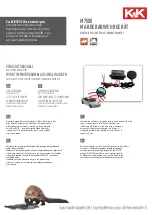
Chapter 4 WLAN Settings
NXC-8160 User’s Guide
58
Figure 23
WLAN > ESSID Definition > WMM
The following table describes the labels in this screen.
Table 19
WLAN > ESSID Definition > WMM
LABEL
DESCRIPTION
SSID
Choose ESSID
Select an ESSID for which to configure the NXC-8160’s WMM parameters.
WMM Parameters
ACK Policy
Select whether to enable the NXC-8160 sends acknowledgement packets for
each data packet received in each of the four WMM parameters:
Background
,
Best Effort
,
Video
, and
Voice
.
Sending an acknowledgement packet increases the reliability of data
transmission as it lets the origination point know that the data was received
intact and that it can transmit the subsequent packet, but doing so also
increases the NXC-8160’s bandwidth usage.
For some data types, packet loss may not be an issue (such as with video
streaming, where missing packets are compensated for by using keyframes
and other types of digital presdigitation to “smooth over” the missing bits). In
such cases, leaving the
ACK Policy
check box unticked will have minimal
deleterious side effects on the data packets’ Quality of Service.
CWmin
This indicates the current value of the Minimum Contention Window for the
given WMM parameter. This is the minimum number of milliseconds that the
NXC-8160 waits for an incoming data packet before sending a retry signal.
Each time a retry signal is sent, the CWmin value doubles in duration until the
CWmax value is reached.
CWmax
This indicates the current value of the Maximum Contention Window for the
given WMM parameter. This is the maximum number of milliseconds that the
NXC-8160 waits for an incoming data packet before sending a retry signal.
The NXC-8160 continues to send a retry signal until the maximum number of
retries allowed is reached.
AIFSN
This indicates the current value of the Arbitration Inter-Frame Spacing
Number for the given parameter. This is the number of milliseconds that the
NXC-8160 waits between receiving data packets.
TXOP-11a/g
This indicates the current value of the Transmission Opportunity (TXOP) for
wireless a and g modes for the given parameter. This is the number of
milliseconds during which the NXC-8160 is allowed to transmit to a client
device once data packet transmission has been initiated.
Summary of Contents for NXC-8160
Page 1: ...www zyxel com NXC 8160 Business WLAN Controller User s Guide Version 1 0 12 2008 Edition 2...
Page 2: ......
Page 8: ...Safety Warnings NXC 8160 User s Guide 8...
Page 10: ...Contents Overview NXC 8160 User s Guide 10...
Page 21: ...21 PART I Introduction Getting to Know Your NXC 8160 23 Introducing the Web Configurator 27...
Page 22: ...22...
Page 32: ...Chapter 2 Introducing the Web Configurator NXC 8160 User s Guide 32...
Page 34: ...34...
Page 64: ...64...
Page 74: ...74...
Page 100: ...Chapter 8 Events Reports NXC 8160 User s Guide 100...
Page 101: ...101 PART V Troubleshooting and Specifications Troubleshooting 103 Product Specifications 107...
Page 102: ...102...
Page 110: ...Chapter 10 Product Specifications NXC 8160 User s Guide 110...
Page 112: ...112...
Page 136: ...Appendix A Setting Up Your Computer s IP Address NWD271N User s Guide 136...
Page 160: ...Appendix B Importing Certificates Document Title 160...
Page 178: ...Appendix D Pop up Windows JavaScripts and Java Permissions NXC 8160 User s Guide 178...
Page 196: ...Appendix F Legal Information NXC 8160 User s Guide 196...
Page 202: ...Appendix G Customer Support NXC 8160 User s Guide 202...
















































